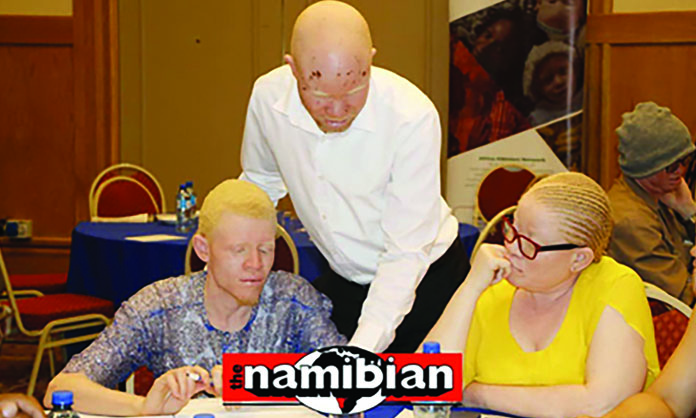For over two years, there has been a shortage of sunscreen and hats at state hospitals.
People with albinism rely on sunscreen and hats to protect their sensitive skins against the sun.
This was revealed by the president of the Namibian Albinism Association Trust, Joseph Ndinomupya, last Thursday.
This, among various other issues of concern, was discussed at a stakeholder engagement and learning forum on the development of a national action plan for persons with albinism in Windhoek last week.
“Albinism Week was first launched by former minister of health Libertina Amathila in 2004 and has been observed since then,” Ndinomupya said.
“However, this year, we decided to invite delegates from different countries, including Kenya, Tanzania and Malawi,” he said.
Albinism Week was this year observed from 7 to 10 November.
Ndinomupya said the event aimed to caucus and share ideas to formulate an action plan for persons with albinism in Namibia.
“We want to ensure that the government and all public and private entities understand that as persons with albinism, we ought to be incorporated in their systems,” he said.
“Additionally, the main aim for approaching the government is to ensure that it allocates a budget to this cause, as in various other African countries,” Ndinomupya said.
He said this would ensure the availability of sunscreen and medical supplies at all times at state healthcare facilities.
“As we speak, it has almost been two years that sunscreen and other products at state facilities have not been distributed,” he said.
Ndinomupya said tailoring an action plan for persons with albinism would allow a proper platform to monitor and hold the relevant people accountable if they fail to implement policies.
He said it would also help to decentralise service provision, as most complaints are reported among communities outside of Windhoek.
“We have well-formulated policies in place, but implementation has been a challenge, hence the need for an effective national action plan,” Ndinomupya said.
Acting secretary general of the National Federation for Persons with Disabilities (NFPDN), Orben Muluti, says for a person with albinism to fully participate as a member of society without endangering themselves in the hot sun, they need proper protection such as sunscreen.
“Sunscreen is ridiculously expensive at pharmacies, making it impossible for the average person with albinism to afford it on their own,” he says.
According to him, the programme currently in place within the health ministry has been inconsistent, as there have been frequent reports of the lack of sunscreen at state hospitals.
“We are very disappointed in the manner in which this programme has been executed by the ministry,” he says.
Additionally, persons with albinism also suffer from low vision and need glasses, he says.
“Glasses are very expensive, and I am sure even those without albinism can allude to this fact,” Muluti says.
He says most persons with albinism are unemployed and are dependent on the N$1 400 monthly disability grant they receive from the state.
However, many do not receive this as some staff members of the Ministry of Health and Social Services refuse to acknowledge albinism as a disability.
Muluti says donations of sunscreen and other products by organisations often do not reach those in need.
National coordinator of the National Organisation for Youth with Disabilities Simon Kauluma says the conference was essential as it focused on crucial matters.
He says it was attended by delegates from all 14 regions.
“The next step would be to submit the thoughts and contributions of the delegates to a legal drafter or consultant, who can make sure our inputs are within our current legislation,” Kauluma says.
Health ministry spokesperson Walters Kamaya yesterday confirmed that there may have been challenges with the availability of sunscreen, attributing this to the ministry’s old procurement system.
He said the ministry has been buying quantities in small volumes, a system which is currently under review.
He said the last consignment of sunscreen received by the ministry comprised 15 000 units and was delivered in July.
Kamaya said the ministry currently has a pending order with FabuPharm and delivery is expected some time next week.
Stay informed with The Namibian – your source for credible journalism. Get in-depth reporting and opinions for
only N$85 a month. Invest in journalism, invest in democracy –
Subscribe Now!






